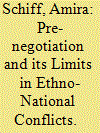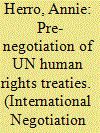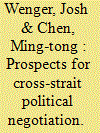| Srl | Item |
| 1 |
ID:
084353


|
|
|
|
|
| Publication |
2008.
|
| Summary/Abstract |
The repeated failures of negotiation in ethno-national conflicts highlight the importance of studying the relationship between the pre-negotiation process and the results of the subsequent formal negotiations. This study examines various factors that contributed to a decision by adversaries to initiate official negotiations, and how these factors affected the prospects for a negotiated agreement. Furthermore, it suggests that certain elements in the pre-negotiation process portend the nature of the changes in the parties' political positions (tactical or strategic) and the parties' readiness to reach an agreement. An exploration is presented using a case study of the negotiations over the Cyprus conflict in 2004 which resulted in the ultimate rejection by the negotiating parties of the Annan Plan in late March of 2004. We examine the connection between the pre-negotiation process, from the end of 2003 until February 13, 2004, and the failure of the formal negotiations in March 2004. The analysis indicates that the deficient method and process of the pre-negotiations that took place regarding the Cyprus conflict determined the subsequent failure of the negotiations. The early detection of such factors in other negotiations over ethno-national conflicts may mitigate the causes that lead to failure, or perhaps assist in managing the process differently, so as to facilitate a more positive outcome.
|
|
|
|
|
|
|
|
|
|
|
|
|
|
|
|
| 2 |
ID:
165679


|
|
|
|
|
| Summary/Abstract |
Since 1965, nine UN human rights treaties have been adopted. Surprisingly, we know little about the conditions under which states arrived at the negotiation table because there has been no serious attempt to empirically identify the unique attributes of pre-negotiation in this context. This article examines the pre-negotiation of the UN Convention on the Rights of Persons (CRPD), drawing on diverse qualitative data sources such as interviews with state and non-state participants. Informed by a constructivist perspective, this study identifies esteem-seeking behavior as a key motivation for some states to negotiate. The article also shows how a transnational advocacy network influenced the pre-negotiation process by leveraging states’ esteem-seeking ambitions and appealing to their reputation as a way of pushing parties to negotiate. Additional tactics that the transnational advocacy network employ at the international level to expedite negotiations are also identified.
|
|
|
|
|
|
|
|
|
|
|
|
|
|
|
|
| 3 |
ID:
165682


|
|
|
|
|
| Summary/Abstract |
The UK ‘Brexit referendum’ set in motion a unique and highly complex set of negotiations to withdraw from a fundamentally embedded economic and political union. The final referendum was preceded by a nine-month pre-negotiation phase; this article examines the dynamics of that stage. The context of a unilaterally initiated negotiation, together with the economic and political costs associated with it, distinguish it from the existing literature. Three analytical approaches are combined and built upon in this article: the tasks of the pre-negotiation phase, the readiness of the temporal moment, and the demands of multi-level, multi-party negotiations. The concept of psychological readiness has broad theoretical import, though explicit recognition is given that negotiators are not unitary decision makers and that the incorporation of a political analysis is required. The combination of these frameworks provides insight into the dynamics of this phase and the difficulties experienced by both the UK and EU27.
|
|
|
|
|
|
|
|
|
|
|
|
|
|
|
|
| 4 |
ID:
156604


|
|
|
|
|
| Summary/Abstract |
This study adopts a pre-negotiation approach based on Robert Putnam's win-set concept to examine domestic constraints on cross-Strait political negotiation. Survey research of elite opinion in both China and Taiwan and of public opinion in Taiwan is used to estimate each side's win-set (that is, the set of political negotiation outcomes that could win majority approval domestically) during Ma Ying-jeou's second presidential term in Taiwan (2012–2016). The possibility for overlap in win-sets that could provide a zone of possible agreement and the potential for coalitions in favour of negotiation are analysed. The study finds no win-set overlap and limited potential for coalitions favouring negotiation outcomes with the least distance from overlap, concluding that domestic conditions for formal political negotiations between Beijing and Taipei are unlikely to be ripe in the near term.
|
|
|
|
|
|
|
|
|
|
|
|
|
|
|
|